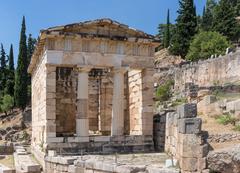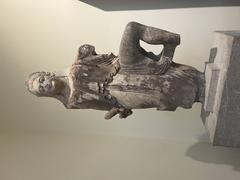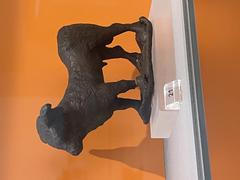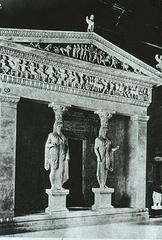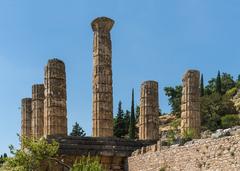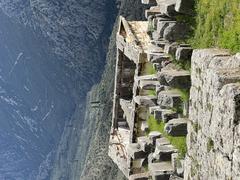
Delphi Theater: Visiting Hours, Tickets, and Historical Significance in Delphi, Greece
Date: 04/07/2025
Introduction
The Delphi Theater, perched dramatically on the slopes of Mount Parnassus, is one of the most iconic and best-preserved ancient theaters in Greece. Part of the UNESCO World Heritage Site of Delphi, it offers visitors not only spectacular panoramic views of the sacred Sanctuary of Apollo and the olive-studded valley below but also a powerful link to the spiritual and artistic traditions of antiquity. This guide provides a comprehensive overview of the theater’s history, architecture, cultural significance, practical visitor information, and tips for making the most of your visit (Greeka; Facts.net; Ancientpedia).
Historical Overview
Origins and Development
Constructed in the 4th century BCE with local limestone, the Delphi Theater was strategically positioned above the Temple of Apollo. Its amphitheatrical design harmonizes with the natural landscape, accommodating an audience of up to 5,000. The theater replaced earlier wooden structures, reflecting Delphi’s rise as a major religious and cultural center. Over centuries, it underwent Hellenistic and Roman renovations, such as the addition of new seating tiers and structural improvements (Greeka; Real Greek Experiences).
Architectural Features
- Cavea (Seating Area): 35 rows carved into the mountainside, divided by a diazoma (walkway).
- Orchestra: A central, circular stage area, approximately 18.4 meters in diameter, for performances.
- Skene: The stage building at the back of the orchestra, used as a backdrop and for storing props.
- Materials: Local limestone ensures the structure’s durability and integration with the landscape.
- Acoustics: Advanced design allows even those seated furthest from the stage to hear performances clearly (Greeka; Ancientpedia).
Cultural and Religious Significance
The Pythian Games and Community Life
The theater was central to the Pythian Games, held every four years in Apollo’s honor. Unlike the Olympic Games, the Pythian Games blended athletic contests with musical and dramatic competitions, all performed within the theater (Ancientpedia; Greek Pathways). This made the theater a focal point for not only entertainment but also religious worship and civic unity, drawing participants and audiences from across the Greek world.
Symbolism and Sacred Architecture
The theater’s placement within the Sanctuary of Apollo and its alignment with sacred geometry reflect the Greeks’ belief in harmony between human creation and the divine order (Delphi Culture). Manumission inscriptions on the theater’s walls bear witness to acts of emancipation performed in a religious context, further illustrating the site’s multifaceted significance (Greek City Times).
Connection with the Oracle
Delphi’s fame also stems from its oracle—the Pythia—who delivered prophecies believed to be inspired by Apollo. The theater, integrated into the sanctuary’s spiritual landscape, was a space for communal reflection on divine mysteries, where dramatic performances often explored themes of fate and morality (The Archaeologist; Greece High Definition).
Transformations, Rediscovery, and Preservation
With the decline of pagan worship and the rise of Christianity, the theater fell into disuse after the 6th century CE. Rediscovered in the 19th century, systematic excavations by the French School of Archaeology revealed its structure and brought new understanding of its historical context (Ancientpedia). Modern conservation efforts aim to protect the theater from environmental and human-induced damage while allowing the public to experience its grandeur (Greek Mythology Worldwide).
Visiting Delphi Theater: Practical Information
Location and Access
- Location: Southern slopes of Mount Parnassus, within the Archaeological Site of Delphi, approximately 160 km northwest of Athens (entrance-fee.com).
- Getting There:
- By Bus: KTEL intercity buses from Athens Kifissos Station (2.5–3 hours) (thedelphiguide.com).
- By Car: Accessible via the EO48 highway; parking is limited and may have restrictions during even-numbered months (thedelphiguide.com).
- On Foot: All main attractions are within easy walking distance in Delphi (thedelphiguide.com).
Opening Hours
- Summer (April–October): 8:00 AM – 8:00 PM
- Winter (November–March): 8:30 AM – 3:30 PM
Arrive early to avoid crowds, especially in summer (curioustravelbug.com).
Tickets
- Standard Admission: €12 (2025 prices)
- Reduced Admission: €6 (children, non-EU students)
- Free Admission: Children under 5, EU citizens under 25, students
- Special Free Entry Days: Every first Sunday from November 1 to March 31 (entrance-fee.com)
- Where to Buy: At the entrance or online for skip-the-line access (greece-tourist-information.com)
Accessibility
- Terrain: Steep, uneven stone paths and steps; good walking shoes are essential (letterstobarbara.com).
- Mobility: The site is not fully accessible for wheelchairs or those with limited mobility due to its ancient and sloped layout.
- Facilities: Restrooms available at the museum, not inside the site; bring water, as shade is limited within the archaeological zone (curioustravelbug.com).
Guided Tours and Audio Guides
- Guided Tours: Available in multiple languages; recommended for in-depth historical context (itimaker.com).
- Audio Guides: Rentable at the entrance or included in some ticket packages (greece-tourist-information.com).
What to See and Do
Theater Highlights
- Seating Capacity: 4,500–5,000 spectators (letterstobarbara.com; ancienttheatrearchive.com).
- Structure: 28 rows in the lower section, 7 in the upper, divided by a walkway (diazoma). The orchestra is 18.4 meters in diameter (ancienttheatrearchive.com).
- Panoramic Views: The orientation provides sweeping vistas of the valley and mountains.
Other Attractions in Delphi
- Temple of Apollo: Below the theater, the centerpiece of the sanctuary.
- Stadium: Above the theater, venue for the Pythian Games.
- Delphi Archaeological Museum: Houses the Charioteer of Delphi and other significant finds (greece-tourist-information.com).
- Tholos of Athena Pronaia: Iconic circular building a short walk from the main sanctuary (entrance-fee.com).
Amenities
- Dining: Traditional tavernas and cafés in modern Delphi offer local cuisine (itimaker.com).
- Accommodation: Options range from luxury hotels to budget guesthouses; book ahead in peak season.
Special Events and Modern Use
Occasionally, Delphi hosts cultural festivals and performances, reviving its ancient tradition as a center for the arts (tourismontheedge.com). Performances are rare to preserve the site, but when held, they offer a unique opportunity to experience the theater’s exceptional acoustics and atmosphere.
Travel Tips
- Best Seasons: Spring and fall for mild weather and fewer crowds; summer brings heat and tour groups, while winter offers a peaceful, atmospheric visit (thedelphiguide.com).
- Early Arrival: For solitude and ideal photography conditions (curioustravelbug.com).
- What to Bring: Non-slip shoes, sun protection, water, light snacks, and a camera.
Frequently Asked Questions (FAQ)
Q: What are the Delphi Theater opening hours?
A: Summer: 8:00 AM–8:00 PM; Winter: 8:30 AM–3:30 PM. Confirm hours before your visit.
Q: How much are tickets?
A: €12 standard, €6 reduced, free for qualifying visitors.
Q: Can I buy tickets online?
A: Yes, online purchase is recommended for convenience.
Q: Is the site accessible for those with disabilities?
A: The terrain is challenging; some areas are partially accessible, but the site is not fully wheelchair-friendly.
Q: Are guided tours available?
A: Yes, in multiple languages, bookable in advance or on-site.
Q: Are food and drinks available inside?
A: No vendors inside; bring water and snacks.
Enhancing Your Experience
- Photography: Capture sweeping views and the ancient stone seats.
- Museum Visit: The Delphi Archaeological Museum enhances understanding of the site’s history (Greek Travel Tellers).
- Explore Modern Delphi: Enjoy local shops, cafes, and sunset views from the village (Get Lost in Wanderlust).
Conclusion
The Delphi Theater is a timeless emblem of Greek civilization, uniting art, religion, and civic life on the scenic slopes of Mount Parnassus. Its preserved architecture, storied past, and breathtaking views offer an unparalleled window into the ancient world. Modern preservation efforts ensure its legacy endures, inviting visitors to connect with the spirit of Delphi—a place where myth, history, and natural beauty converge.
For the most up-to-date information, download the Audiala app for audio tours and visitor updates, and check official sources like the Greek Ministry of Culture.
References
- Greeka
- Facts.net
- Real Greek Experiences
- Ancientpedia
- Greek Mythology Worldwide
- The Archaeologist
- Greek Pathways
- Greek Reporter
- Delphi Culture
- Greek City Times
- Greece High Definition
- Pourquoi Pas Nous
- Greece Tourist Information
- Curious Travel Bug
- The Delphi Guide
- The Brain Chamber
- The Tourist Checklist
- Epos Travel Tours
- Get Lost in Wanderlust
- Greek Travel Tellers
- Entrance-Fee.com
- Ancient Theatre Archive
- Itimaker
- Tourism on the Edge
- Letters to Barbara





